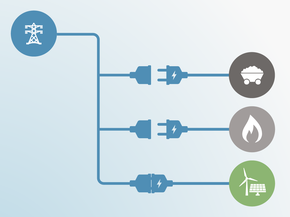Country summary
Overview
In June 2021, Germany adopted an amendment to its climate law and a climate and energy package, together with a EUR 8bn emergency programme for climate mitigation measures mainly in the buildings and industry sectors. This followed a constitutional court ruling that stated Germany’s climate targets were too weak and put future generations at danger. The amended law includes the target of a 65% national emissions reduction below 1990 levels by 2030 (up from 55%) and moves Germany’s climate neutrality target forward five years to 2045.
The devastating flooding that has hit parts of Germany in summer 2021 brought broad awareness for the negative impacts of climate change in Germany and growing demand for increased and early climate action by all countries, in particular an earlier coal phase-out date.
To be in line with the 1.5°C limit of the Paris Agreement, Germany should reduce national emissions by at least 69% below 1990 levels by 2030. To contribute its fair share Germany also has to significantly increase its international climate finance.
Germany’s electricity mix is still heavily dependent on fossil fuels. While coal generation has halved since 2015, natural gas has more than doubled its share, and total fossil generation has fallen by only 31%. German power plants emitted about 10 MtCO2e more in the first quarter of 2021 than in the same period in the previous year, which could potentially foreshadow rising emissions in 2021. Around two thirds of electricity generation emissions in 2020 came from lignite and hard coal-fired power plants, and 16% of the country’s total emissions still came from power and heat generation from coal-fired power plants.
Germany’s scheduled 2038 coal phase-out is not 1.5˚C compatible, and the country’s coal generation has declined much slower than other countries such as the UK and Italy. An earlier coal phase-out could be driven by the diminishing economic viability of the power source: the German fleet has collectively lost more than EUR 1bn since the end of 2018.
The CAT rates Germany’s overall climate targets, policies and finance as “Insufficient”. The “Insufficient” rating indicates that Germany’s climate policies and commitments need substantial improvements to be consistent with the Paris Agreement’s 1.5°C temperature limit.
We rate Germany’s newly adopted 2030 emissions reduction target as “Almost sufficient” when compared to modelled emissions pathways, consistent with 2°C of warming. While the proposed national 2030 target represents a significant improvement on the previous one, Germany’s new target is not stringent enough to limit warming to 1.5°C and needs further improvements. We rate Germany’s target as “Insufficient” when compared with its fair-share contribution to climate action. Germany should both further increase its emissions reduction target and provide significantly more and predictable finance to other countries to meet its fair-share contribution. To achieve its target, Germany needs to enhance its policies and actions.
We rate Germany’s policies and actions until 2030 “Almost sufficient”. We project that implemented and announced policies and actions will lead to emissions reductions of between 54-57% below 1990 levels by 2030 excl. LULUCF and considering the additional impact of the COVID-19 pandemic. This falls short of Germany’s 2030 target of at least a 65% reduction below 1990 levels.
In June 2021, Germany has adopted a new climate law with updated national targets, and a climate and energy package together with a EUR 8 billion emergency programme. In its climate and energy package the government agreed on raising the tender volume for wind power from 3 GW per year to 4 GW and for solar PV from 4 GW to 6 GW – still far behind the historical highs of 7 GW (2017) and 8 GW (2011), respectively. In 2020, emissions from natural gas significantly increased and about 16% of total German emissions still came from power and accompanied heat generation from coal-fired power plants. While Germany has agreed on a coal phase-out by 2038 and the first rounds of phase-out tendering have been held in 2020 and 2021, the schedule is not fast enough to be compatible with the new climate targets, let alone a 1.5°C pathway.
While emissions in the transport sector have decreased in 2020 due to the COVID-19 pandemic and the share of alternatively powered vehicles in new registrations is continuously growing, the transport sector still shows the largest gap (40 to 43 MtO2e/year) between projected emission levels and the sectoral government target for 2030. Important steps have been taken in the industry sector, including a EUR 2bn financial aid scheme, supporting research on innovative technologies for decarbonising heavy industry and a strategy for climate-friendly steel production. While these are steps in the right direction, they are likely insufficient to reach a full decarbonisation of the sector.
To move onto a 1.5°C pathway Germany would need to phase out coal by 2030, increase its renewable energy target for the electricity sector to around 90% or more by 2030, increase the uptake of new electric vehicle sales to at least 95% of the market by 2030, and significantly reduce the emissions intensity of its heavy industry.
The full policies and action analysis can be found here.
We rate Germany’s 2030 reduction target of 65% below 1990 levels as “Almost sufficient” when compared to modelled emissions pathways. The “Almost sufficient” rating indicates that Germany’s proposed domestic target in 2030 is not yet consistent with the Paris Agreement’s 1.5°C temperature limit but could be, with moderate improvements. If all countries were to follow Germany’s approach, warming could be held at—but not well below—2°C. While the proposed target represents a significant improvement compared to its previous target, Germany’s new target is not stringent enough to limit warming to 1.5°C and needs further improvement.
The CAT’s assessment of Germany’s total fair share contribution takes into account its emissions reduction target and its climate finance.
We rate Germany’s 2030 target of 65% below 1990 levels excl. LULUCF as “Insufficient” when compared with its fair-share emissions allocation. The “Insufficient” rating indicates that Germany’s fair share target in 2030 needs substantial improvement to be consistent with the Paris Agreement’s 1.5°C temperature limit. Germany should both further increase its emissions reduction target and provide significantly more and predictable finance to others to meet its fair-share contribution. Germany’s target is at the least stringent end of what would be a fair share of global effort and is not consistent with the Paris Agreement’s 1.5°C limit, unless other countries make much deeper reductions and comparably greater effort. If all countries were to follow Germany’s approach, warming would reach over 2°C and up to 3°C.
Germany’s international public climate finance contributions are better than most developed countries but still rated insufficient. Germany has committed to increase its climate finance, but contributions to date have been low compared to its fair share as assessed by the CAT. To improve its rating, Germany needs to increase its international climate finance contributions significantly in the period post-2020 and urgently stop funding fossil fuels abroad. Therefore, the CAT rates Germany’s international climate finance “Insufficient”.
Germany’s climate finance is not sufficient to improve the fair share target rating, and the CAT rates Germany’s overall fair share contribution as “Insufficient”.
In June 2021, Germany adopted its 2045 net zero target in its revised climate law. The net zero target generally covers key elements but fails to meet good practice standards for some of them. We evaluate the net zero target as: “Average.” The German government needs to legislate its commitments to include international aviation and shipping emissions and concretise its planning on how to reach the 2045 target to improve its rating to “Acceptable”.
Further analysis
Latest publications
Stay informed
Subscribe to our newsletter






